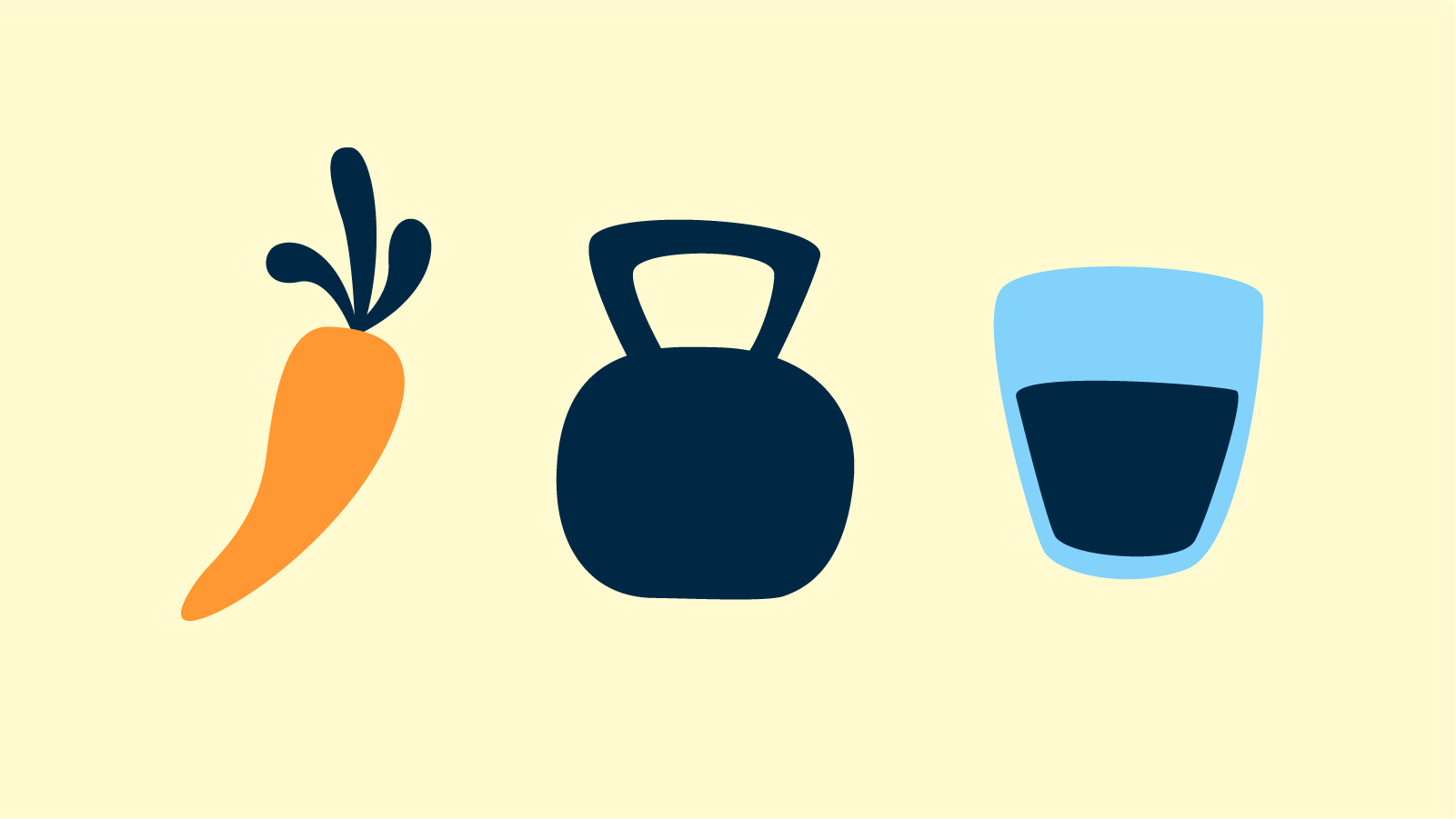Feel like you’re doing everything right but can’t seem to lose weight? This is because losing weight isn’t a linear process.
Being overweight puts us at risk of long-term conditions, so if you’re on a journey to a healthier weight, you’re already making good decisions about your health.
But it’s important to lose weight sustainably and consider the many factors that can influence your weight loss. This way you’ll be on track to maintaining a healthier weight – and healthier mind – for good.
What’s a calorie deficit?
A calorie deficit is when you burn more calories than you consume. It’s achieved through the help of:
A diet that restricts the amount of calories you consume. Exercise that helps you burn more calories than you would without movement.
You do need a calorie deficit to lose weight, but the formula isn’t as always simple as it seems – there are many things that can contribute to weight loss and maintaining a healthy weight.
How many calories should I eat a day?
The recommended amount of calories per day is 2,000 for women and 2,500 for men. To lose weight long-term in the healthiest way, it isn’t best to significantly reduce your calorie intake, but instead consume a little less while keeping active. Balance is key.
10 potential reasons you’re not losing weight in a calorie deficit
1. You’re expecting quick results
Weight loss can take hard work, consistency and most importantly, patience. If you’re disappointed with the amount you’ve lost across a few months, step back and look at the bigger picture. Do you want to drop a dress size for your next event only to regain the weight straight after? Or slim down the healthy way and keep it off?
When we rush weight loss, our bodies can become out of sync and we’re more likely to rebound. For sustainable weight loss make small, steady adjustments and think about how you want to feel in a year’s time, not next week. It’s about a shift in lifestyle and not just weight.
2. You’re eating less, but could make healthier choices
This is where a calorie deficit alone isn’t a magic formula. Reducing your calories to 1,500 a day but eating processed foods instead of healthy fats, protein and fruit and veg won’t give you long-term results. You could also be limiting how healthy you feel overall.
Evidence shows that cutting back on processed carbohydrates and switching to complex carbs is more effective for lasting, sustainable weight loss. This is because sugary carbs impact the way we store fat.
Protein and fibre-rich foods have lots of nutritional value and will help you feel fuller for longer. Try to think about the quality of your calories, not the quantity.
3. You’re not keeping track
It’s human nature to give ourselves a pat on the back for eating a healthy meal, then dismiss the naughtier food we eat at the weekend. If you track everything you’re eating you may see your calorie intake is higher than you thought. An app or journal can help with this if you need structure.
If you’re choosing healthier foods but eating more of them, you could be consuming more calories than you realise. While boiled new potatoes are a better choice than oven chips, it’s important to be mindful of eating twice as much. If you prefer not to count your calories, try simply using a smaller bowl or plate to control your portions.
4. You’re not doing the right exercise
It’s great if you’ve kickstarted your weight loss journey with regular exercise. But it could be that your routine isn’t helping you lose weight. It can be tricky to know the best thing to do at the gym, especially because we’re all different, but speaking to a member of staff, personal trainer or a doctor could help you know if you’re on the right track.
Try your best to stay motivated if you’re working out but not losing weight – any physical activity has a host of other health benefits, and regular exercise is linked to better mental health.
5. You’re drinking too much alcohol
It’s easy to only consider calories in solid foods, but the hard truth is that drinking increases your calorie intake too. Just 1 standard glass of wine has 133 calories, while a pint of beer has 239 – about the same as a Mars bar. And these are ‘empty’ calories with no nutritional value.
If you’re counting calories, make sure you add each drink. And try making swaps for lower calorie options, like choosing white spirits and sugar-free mixer over wine or beer.
It goes without saying that cutting down on alcohol altogether will benefit your weight loss and overall health.
6. You’re simply getting older
One of the many changes that happen to our bodies as we get older is that it’s harder to lose weight. In your 20s, weight loss might be as simple as cutting back on a few treats, but a loss of muscle mass as we age means we need to put in more effort to burn fat. For women, hormonal changes throughout the perimenopause and menopause, like a lack of oestrogen, also increase the amount of fat stored in the body.
If you’re finding weight loss harder than you used to, put more emphasis on strength training – use weights or resistance bands to increase your muscle mass and burn fat more efficiently.
7. You’re under stress
Stress affects the body in many different ways, one being that it can hinder weight loss progress. Major life changes like a break-up or divorce, a bereavement or high stress at work can all be triggers for weight gain.
When there’s a lot of stress in your life it’s harder to stay focused on healthy weight loss and keep track of what you’re eating. Then, not meeting your weight loss goals can make you more stressed.
It’s important not to be hard on yourself if you’re not in your best place – talking to a trusted friend or therapist can help.
8. You’re not getting enough sleep
Sleep is essential for weight loss, even in a calorie deficit. Research shows that people who get an average of under 6 hours’ sleep a night are more likely to be overweight.
A lack of sleep causes your levels of leptin – the hormone that tells you to stop eating – to decline, and your levels of the ‘hunger hormone’ ghrelin to increase.
You may also find that when you’re sleep deprived you make poorer food choices, and high-calorie options seem much more tempting. Try to get 7-9 hours’ shut eye a night to help your body work at its best.
9. There’s a medical reason you’re struggling to lose weight
Some conditions, like those that affect your hormone levels, insulin or blood pressure, can make it more difficult to lose weight. These include:
- An underactive thyroid
- Diabetes
- PCOS
- Heart disease
- The menopause
- Depression
Difficult losing weight is also a side effect of some medications, including:
- Beta blockers, prescribed for heart and blood pressure issues
- Certain contraception
- Certain antidepressants
- Medication used to treat type 2 diabetes
- Hormone replacement therapy (HRT)
If you don’t have a diagnosis but have symptoms as well as difficulty losing weight, it’s worth speaking to a doctor.
10. You’re more focused on weight loss than your overall health
If you’re making healthier choices, you might feel better in other ways. Your skin might be clearer, you might be digesting food more easily or you might feel a boost in your self-esteem. And although you can’t see it, you could be reducing your risk of serious health conditions in the future.
It’s important to appreciate the many benefits that come with a healthy lifestyle, not just the number on the scales. It can take a lot of courage to change your habits, and if you take the right steps, it will pay off.
When should I speak to a doctor?
If you have worries about your weight or want to discuss starting your weight loss journey, a doctor can help. They can determine whether you might have any medical conditions and give healthy lifestyle advice that’s right for you.
This article has been approved by Dr Bryony Henderson, Lead GP at Livi.


